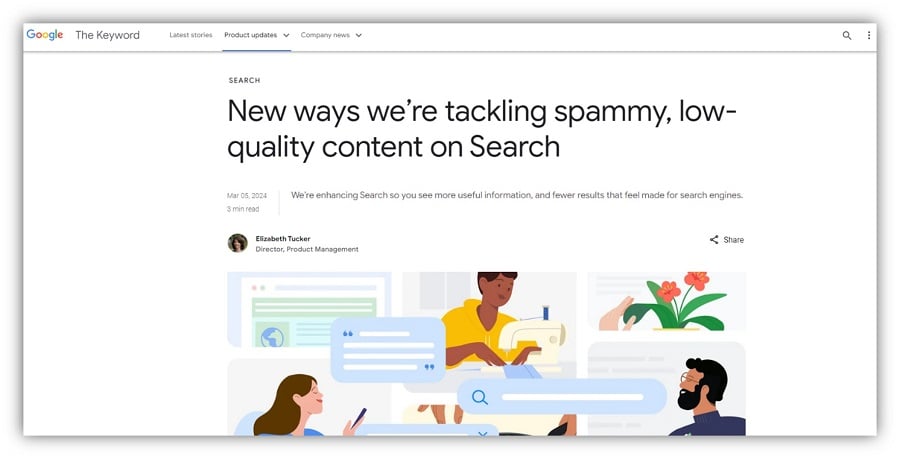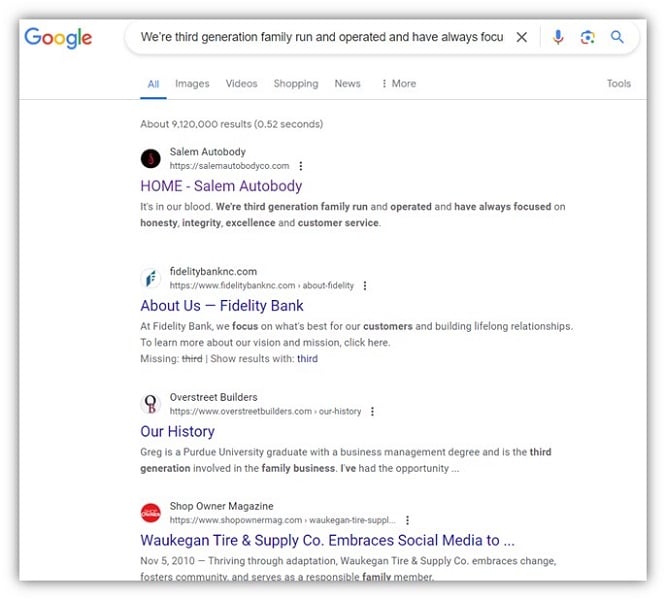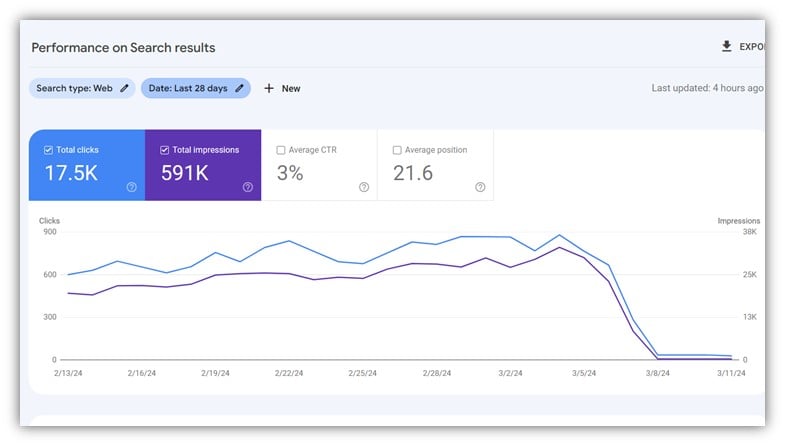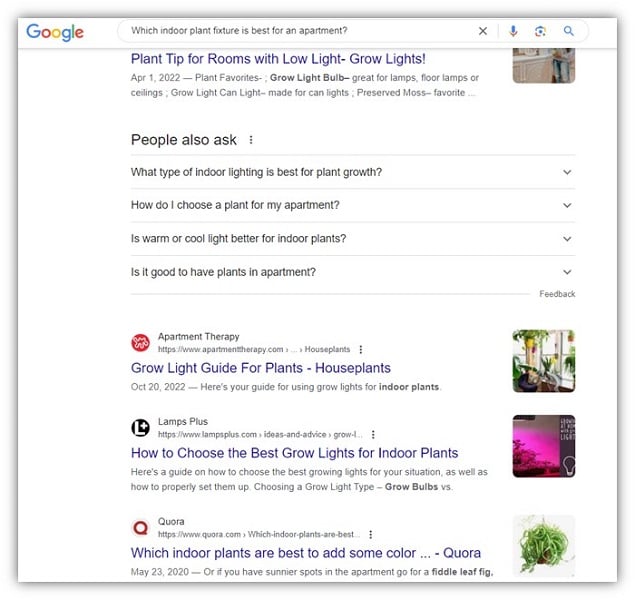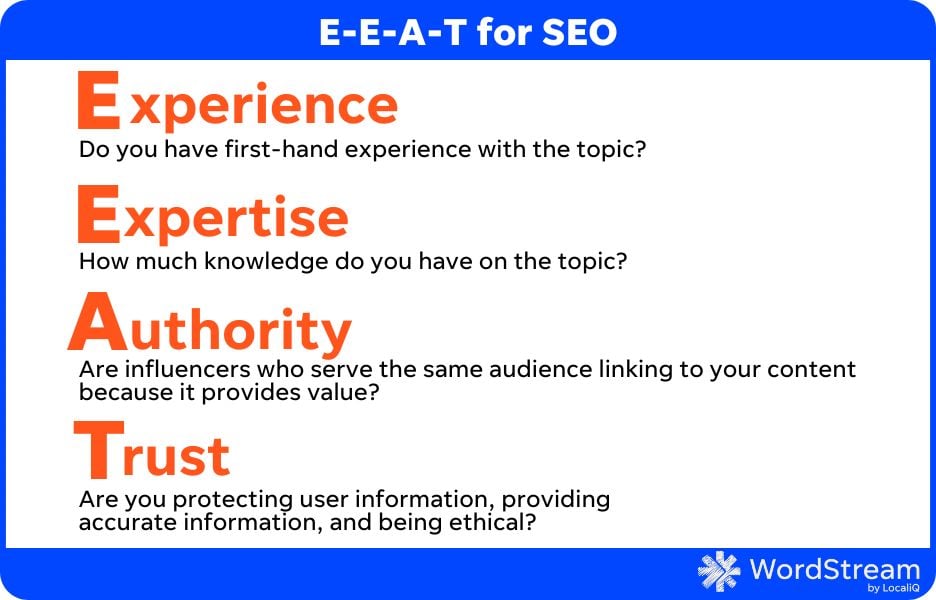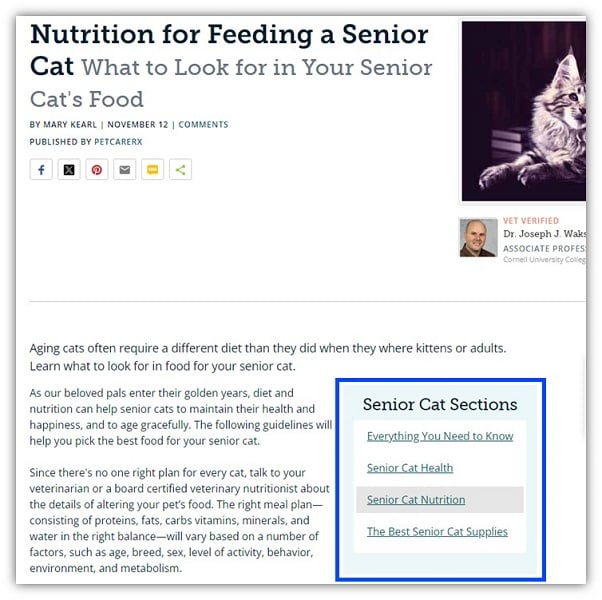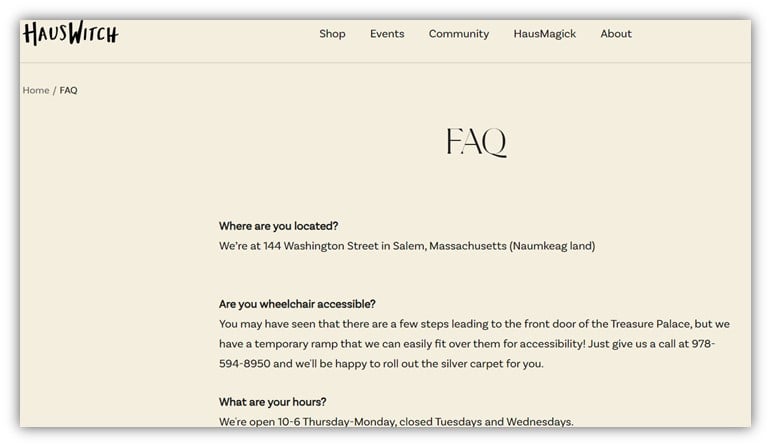Google’s core algorithm updates have always been something SEO experts, marketers, and growing businesses alike have had to adapt to.
Each update evolves how search results are curated for your audience, and some updates are more significant than others. For example, we recently saw two major Google algorithm updates roll out in October 2023 and March 2024, both focused on addressing low-quality or spam content. These updates can impact rankings over the course of the following few weeks or months, and many businesses have had to pivot their SEO strategy accordingly.
To understand exactly how these updates have been affecting various sites, we talked to six experts to get their take on what they’ve noticed so far and how businesses should pivot during these tumultuous times on the SERP.
Table of contents
How the latest Google core algorithm updates are impacting businesses
Here is the verdict on the latest major Google core algorithm updates—according to our expert sources!
? Looking for more SEO tips and insights? Download our free guide on 10 tangible and no-cost ways to get on the first page of Google.
1. Previously high-ranking content may have lost value
Taking a deeper dive into the updates, it’s apparent that some content you may have not previously considered to be spam could now fall into this category inadvertently.
“In the March update announcement, spam is categorized into three categories: scaled content abuse, expired domain abuse, and site reputation abuse. These types of abuse have become increasingly common in the SEO world over the past two years,” said Goran Mirkovic, Chief Marketing Officer at Freemius.
“Scaled content abuse primarily targets the surge of mass-produced AI-generated content. Google’s policy explicitly states that it rewards high-quality content, regardless of how it is produced. The problem lies in the misapplication of AI, resulting in generic and low-quality content which is now overflowing the internet in every category,” said Goran.
“Meanwhile, expired domain abuse aims to end the misuse of expired domain authority to host irrelevant and low-quality content. Google will penalize domains that are irrelevant when comparing their old content to their new content.
Lastly, site reputation abuse is Google’s attempt to combat ‘parasite SEO,’ which involves using high-authority websites to rank for competitive keywords. You may have noticed many big publishing sites hosting pages with titles like ‘X best products’ in an attempt to gain visibility,” said Goran.
Now, you might be thinking at this point that your business doesn’t have content that falls under any of these three spam categories. However, other types of common website pages could still see a hit from these updates.
“I’ve seen some sites begin to struggle with original content that they’ve copied and minimally altered,” said Mark Irvine, Vice President of Search at SearchLab.
“For instance—a client previously wrote a decent page about his services, no issues there. But the client then copied that content and published that same page for over 100 towns that he serviced—only changing the city name for each page. That may have gotten him some small incremental SEO bumps when he first did it, but now we’re increasingly seeing even the original page get less and less traffic to it,” said Mark.
In this example, individual site pages for each service location could potentially lose SEO value.
2. AI-generated content is seeing the biggest hit
Aside from unoriginal, expired, or disreputable content, varying AI-generated content is the primary reason we’re seeing these updates from Google. Generative AI can be great for content ideation, brainstorming, and more. However, there are some serious risks involved with using AI to scale your content and SEO strategy.
“The biggest challenge I’ve seen is with clients who previously benefitted earlier in 2023 with an overabundance of easy (and often unoriginal) content. AI-generated content was a very fast and painless way to speed up filling out blog or site pages. In moderation, with the correct AI prompts, AI content can still be helpful,” said Mark.
“But the current large language models (LLMs) that drive popular AI tools borrow from the content and language that’s already published across the web. It’s difficult for AI content to contribute a unique or creative perspective that’s different from other pages across the web. These new updates penalize a lot of content that’s not very different from original sources,” said Mark.
Remember, the problem doesn’t lie in AI-generated content itself. It seems Google is looking to strike a balance between the most efficient search results while maintaining that “human touch.”
“Google’s core updates always aim to improve the results being served to users. The latest updates are no different. As the internet is flooded with AI-generated content Google’s task has grown more difficult,” said Milen Vasilev, Director of Digital Presence Implementation at LocaliQ.
“They are aiming to keep their results more relevant through more granular weeding and accounting for more unique, quality content in which the ‘human touch’ shows.”
? Get a handle on how to use AI for marketing the right way with our free emergency guide to AI in marketing!
3. Competition has increased for some industries
How you approach your SEO content is going to depend on your niche market. It’s more important than ever to make your business stand out within your specific industry.
“Google isn’t just targeting AI-generated content. I’ve unfortunately seen several clients lose a lot of their organic traffic after previously partnering with a respected SEO agency that specializes in one particular vertical (agencies that just do SEO for lawyers, car dealerships, HVAC, etc.).
Google’s updates strongly prefer original, unique content. Some agencies fall into the trap of writing a great piece of relevant content for one client but reusing it dozens or hundreds of times for their different clients,” said Mark.
“A good oil change page on a car dealership’s site can bring a lot of great SEO value to your first client’s site—but that same page reused a thousand times over begins to get ignored by Google, particularly after these updates.
I’d encourage clients to check the originality of their key site content. Open some of your most popular website pages, copy the first sentence, and paste it in quotation marks into the Google search bar. If Google returns hundreds of pages with the same wording, there’s no way that it’s going to prefer your page over any others.”
This auto repair shop website has similar content to other adjacent businesses.
4. Some sites are seeing a decrease in traffic…
One of the most noticeable impacts of the October 2023 and March 2024 core updates is the dip in website traffic some businesses have been experiencing.
“We’ve seen some dips in organic traffic and keyword rankings, more so with clients who’ve previously used AI to produce content at scale (with little human editing),” said Allie Decker, co-founder at Omniscient Digital.
“By the end of March, most of our clients had rebounded, and those pages that are still recovering have indicated where we need to optimize and update content.”
An example of a website traffic drop that aligns with the start of the March 2024 update.
5. …and others have only seen traffic fluctuations
On the other hand, other websites have only seen fluctuations in traffic and keyword rankings. This might be because the updates are still rolling out. Plus, SEO is a long-term game, so it’ll be crucial to watch your site over the next few months to see how these updates develop results over time.
“Personally, I haven’t noticed any significant changes just yet,” said Goran. “It’s still early, and I predict it will take about a month for the update to be fully implemented. However, I expect to see some fluctuations in search results and a noticeable decrease in the visibility of what Google now considers ‘unhelpful’ content.”
? Get more website traffic fast with our free guide to proven strategies for driving more traffic to your website—no matter what updates roll out!
6. October 2023 and March 2024 updates are more complex than others
If you’ve been struggling to get a handle on the recent Google core algorithm updates, it’s not just you. Business owners, marketers, and experts have all agreed that changes to the SERP have become more unpredictable.
“The organic landscape as a whole has changed substantially since the more rapid onset of core algorithm updates started in October of 2023,” said Alex Chefalo, Senior Strategist at 829 Studios.
“This update is more complex than previous ones because it involves changes to multiple core systems, whereas previous updates focused on updating single systems. The main purpose of this update is to combat what Google identifies as ‘spam’ in the search engine results pages (SERPs),” said Goran.
7. Specific industries may have been impacted more than others
Updates from Google over the past few months have impacted rankings across the board, but it’s been found that some industries may be feeling the heat more than others.
“We saw the helpful content update roll out in September through October 2023—this focused on the quality user-centric content and, on the flip, side weeding out AI-generated content,” said Milen.
“We also saw more core updates in October through November 2023 that shook up rankings a bit. In early March 2024, Google rolled out a core and a spam update. We saw the highest volatility in ranking in food and drink, beauty and fitness, and shopping industries (according to Semrush data). Home and garden sites also saw a lot of ranking shifts.”
If you’re in these industries, this doesn’t mean you have to throw in your SEO towel altogether. However, it’s important to know whether your business’s vertical has a higher risk of impact from Google’s updates. That way, you can better prepare and maintain a keen eye over your site’s performance.
An example of how search results for the home and garden industry could vary.
8. The updates are impacting PPC, too
Let’s not forget what shares the SERP with organic results: Google Ads. While the core algorithm updates apply to organic search rankings, the same SEO trends emerging from these updates have trickled into PPC. When one part of the SERP changes, every part of the SERP changes.
“One of the biggest things I watch for when a core algorithm rolls out is upticks in keyword variant matching,” said Navah Hopkins, Brand Evangelist at Optmyzr. “While this is anecdotal, I tend to see a rise in close variant search terms with algorithm updates. Since Google Ads broad match behavior and organic search share a lot of the same technology, it makes sense they would impact each other.”
“My biggest advice is to keep an eagle eye on those search terms, as well as any rules you might have for negatives,” said Navah.
If you sell products via organic search or Google Ads, consider trying Google Merchant Center (GMC) to secure more SERP placements.
“Starting with the SERPs, Google has been dedicating an increasing amount of space to rich results. If you are in the ecommerce space, making sure that you set up Google Merchant Center and add the relevant schema to your product pages should be a major priority,” said Alex.
“Not only does GMC offer free listings but they are constantly beta testing new ways to use these rich results. For example, I was looking at running shoes for a client. The SERP was an interactive rich result that allowed me to swipe left and right on styles I liked.
While the end goal is clearly to get you into paid Shopping ads, taking advantage of the free GMC listings can be a great way to gain more value for your own business or (if you’re an agency) your clients’ business.”
? Find out how your industry’s PPC metrics may have also recently shifted with our latest search ad benchmarks!
How can you prepare for future Google core algorithm updates?
While changes coming from Google can sometimes feel unpredictable, one thing you can always count on is more to come. So, how can you be ready for the next major Google core algorithm update? Here are a few expert tips to help you prepare.
1. Continue to prioritize E-E-A-T…
The four themes of E-E-A-T (experience, expertise, authority, trust) are the foundational pillars of any strong SEO strategy. While focusing on E-E-A-T may feel like a given, it’s important to remember how sticking to the fundamentals during tumultuous times on the SERP can pay off.
“The best way to prepare for future updates is simple: create high-quality, human-written content infused with fresh data, first-hand experience, and other E-E-A-T factors,” said Allie. “Optimize for the user—think from first principles and build programs to serve your target market (your current or potential customers).
Know what your audience cares about, understand how they utilize and interact with search, and create content to meet them where they are. This is not only effective in the short-term—Google appreciates topical consistency and fresh, quality content—but it also builds long-term resilience in the form of an organic growth program. As a bonus, you won’t have to panic every time there is an algorithm update,” said Allie.
“TL;DR: be patient and don’t try to “hack” the system. It never serves you well!”
The hardest part of digital marketing is patience, but with dedication to E-E-A-T, your long-term SEO goals can still pay off.
“The best bet is to start evaluating the quality of your content by ensuring it’s optimized for EEAT,” said Goran. “If you leaned on AI these last two years to get a lot of SEO stuff out, it’s time to think about how to elevate the quality of that content.”
2. Emphasize your site’s UX and navigation
Beyond the basics of E-E-A-T, businesses should pay extra attention to how the user interacts with content. Google is putting more and more emphasis on user experience (UX), so you’ll want to optimize your website content with that in mind.
“The SEO fundamentals are largely the same—what matters most is focusing on quality and execution while creating for users—not for search engines,” said Milen.
“We think of SEO in terms of content, core technical, deep technical, health checks, and off-site. Across all these, the key is to create for users and help them get the answers or services they need.
Write helpful content, structure your site logically and neatly, and fix broken pages (so users do not go to dead ends—nothing is more frustrating!). Last but not least, keep a stellar online presence on Google Business Profile, social media platforms, and everywhere that matters to your business.”
Including a table of contents like this on your page is one way to help users find answers to their questions quickly and easily.
3. Create question-based content
As you create and optimize content, you’ll want to think of the customer journey and consider how your potential customers might structure search queries. For example, a lot of Google’s updates are meant to help better answer common question queries. Looking at the “people also ask” and “related searches” portions of the SERP can give you ideas for long-tailed, question-based keywords you could work into your page headers, subheadings, and text.
“Another area of change has been the way that people search,” said Alex.
“Generative AI is shaping the way that people interact and ask questions within search engines. Creating content based on questions or including questions inside of headers isn’t exactly an earth-shattering revelation, especially for those out there who have been optimizing this way for voice search.
However, it is a good way to target long-tailed keywords with high intent while future-proofing your content as AI integrates more directly with organic search. Gemini (formerly known as Bard) is already pulling in results from informational site pages if you ask for product recommendations, so including FAQs in your content, tagging them with the proper schema, and making them as efficient as possible for crawlers to evaluate should help give you a leg up.”
4. Conduct SEO audits regularly
This last tip for surviving Google algorithm updates could arguably be the most important. To get ahead of Google at its own game, you’ll want to stay on top of your performance tracking. Regularly checking in on your SEO performance with scheduled SEO audits can help you account for any traffic or keyword ranking changes before they snowball into large-scale issues.
“To survive this update, people need to do some auditing and see if they have something on their sites that falls into these new categories,” said Goran. “If you have bad listicles—delete and redirect them! If you have irrelevant content on the site—delete that too!”
What these expert takes on Google core updates have in common
While everyone’s experience in the current world of SEO is different, one thing we can all agree on is that quality content with a human touch is still king. While the state of SEO will continue to ebb and flow, being able to pivot and flex to the changes Google throws at us is half the battle when looking to rank on the SERP. If you tried our tips for staying afloat during these updates, but still want more out of your SEO strategy, see how our solutions can help you maximize your SEO success no matter what Google throws your way!
To recap, here is what the latest Google core algorithm updates mean for growing businesses:
- Previously high-ranking content may have lost value
- AI-generated content is taking the biggest hit
- Competition has increased for some industries
- Some sites are seeing a decrease in traffic…
- …and others have only seen traffic fluctuations
- October 2023 and March 2024 updates are more complex than others
- Specific industries may have been impacted more than others
- The updates are impacting PPC, too
Here is what you can do to prepare for future Google core algorithm updates:
- Continue to prioritize E-E-A-T…
- Emphasize your site’s UX and navigation
- Create question-based content
- Conduct SEO audits regularly

